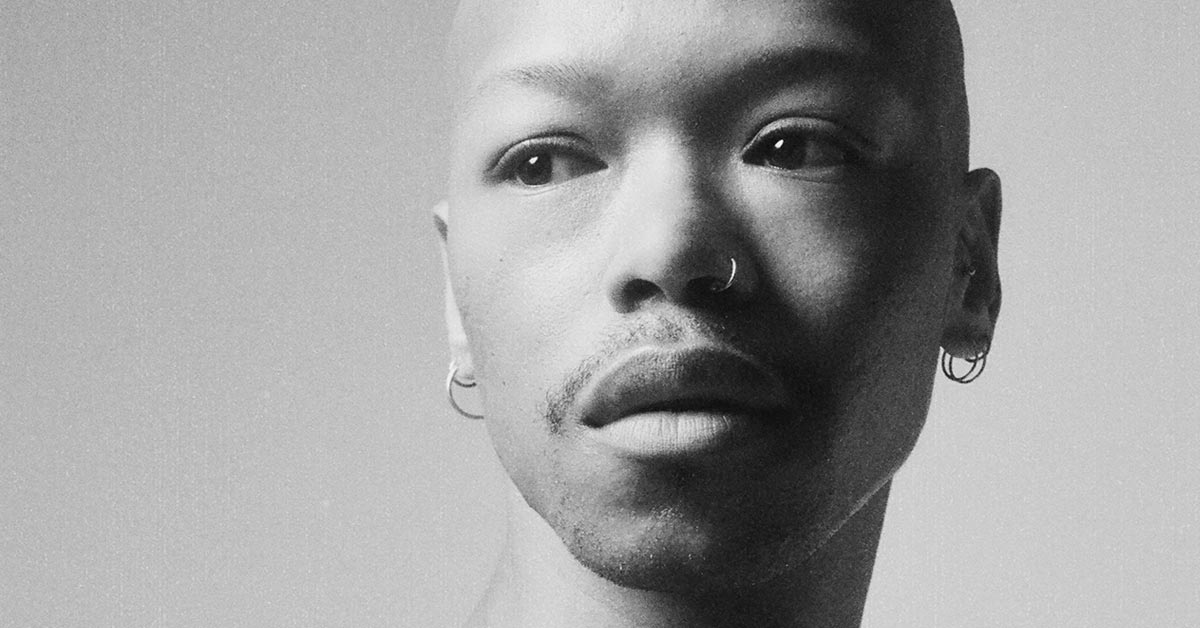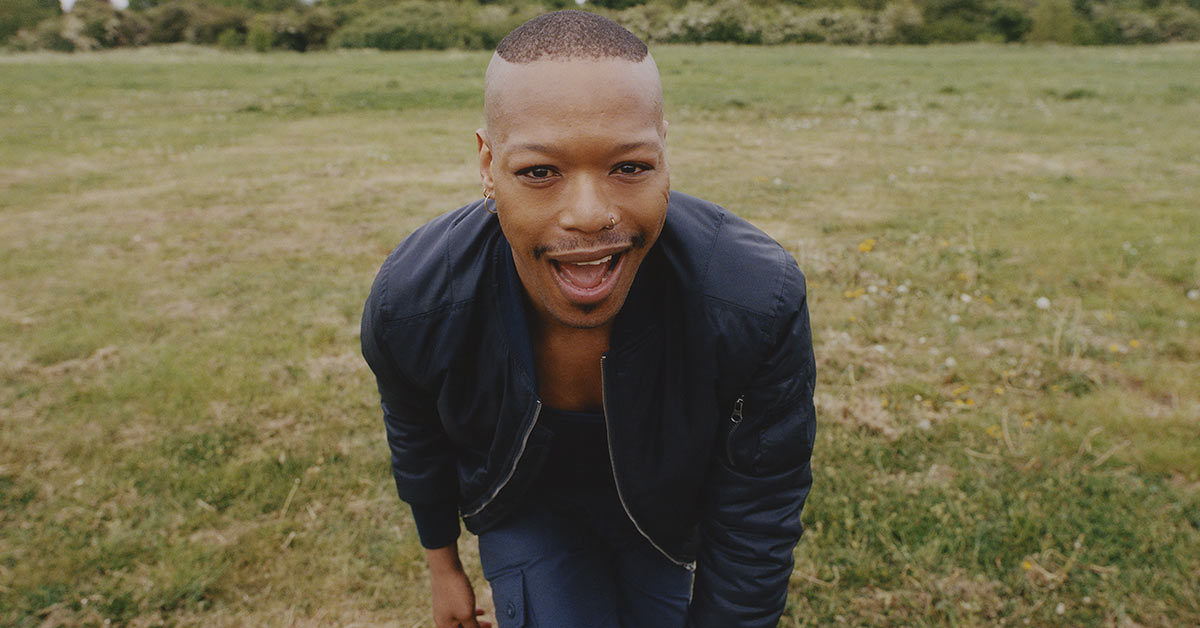Nakhane speaks ‘Bastard Jargon’

Nakhane set out to make a more danceable and reflective pop album (Photo: Alex de Mora)
South Africa’s queer creative innovator Nakhane has released their third album, Bastard Jargon, a dancier and gritter work that Nakhane says is rooted in “existential sex”.
Many of the songs on Nakhane’s previous album, 2018’s You Will Not Die, were written while the artist was still living in South Africa, where they had grown up gay in an increasingly fundamentalist Christian family.
Given the trauma it drew on, Nakhane says, You Will Not Die wasn’t exactly a party album – a fact underlined when the time came to play festivals.
Nakhane was playing the 2 pm slot, just as the crowd were warming up with a few beers, “the sun is blaring on us and I’m singing these sad songs to people who just want to dance and I thought ‘I can’t keep crying for people. I want to write an album that has movement in it, you know?’”
The result is Bastard Jargon, a pounding, physical, hot-blooded third album which sounds like grit sprayed over shiny pop. Written over 18 months in Lisbon, Ghent, Oxfordshire, London and Hastings, “It’s an existential sex album,” says the artist.
“Almost every song on it has some kind of wink towards sex. It’s not necessarily a seductive, come to me, bedroom eyes kind of sex – it’s much more inquisitive, psychological sex. When I wrote You Will Not Die it was at the end of my relationship with Christianity, and then when I wrote Bastard Jargon I’d moved to London and I threw myself into just wanting to feel good.”
To realise this lustful vision, Nakhane recruited Nile Rodgers as executive producer, having first met the Chic legend at the BBC doing Later With Jools Holland.
“I was in the makeup room, I got up to say hello, slipped and fell into his arms. It was like a romcom but also quite humiliating. We exchanged numbers and I thought that was it, but I thought of him when I wanted someone to do production work on my album and he said ‘Sure, I’d love to’.”
“When you have sex with somebody and then they have really scary views, you feel tainted.”
Rodgers plays on the second track (and co-produced 5 others), Tell Me Your Politik, along with a ferocious rap from South African performer Moonchild Sanelly. The song is Nakhane’s densely pulverising demand for prospective lovers to be ideologically aligned.
“I wanted it to sound like a pack of wolves barking, saying ‘unless you get your politics right I’m not gonna fuck you,” Nakhane says. It’s a song drawn from their real life. “Oh my god, you have no idea. When you have sex with somebody and then they have really scary views, you feel tainted.”
Other producers on Bastard Jargon include John Congleton (St Vincent, Angel Olsen, Sharon Van Etten), Leo Abrahams (Wild Beasts, Brian Eno, Regina Spektor), Matthew Herbert , BLK JKS (a South African rock band), Max Hershenow (previously of MsMr) and Emre Turkmen (previously of Years and Years).
All 10 songs were written or co-written, and co-produced by Nakhane, who also has an engineering credit on most of the tracks. Due to the pandemic, the album was largely made remotely, a process the artist enjoyed.
“Sending music files back and forth, the process becomes a little faster. It becomes about trust and kindness, because it’s quite difficult to detect someone’s tone on email so you have to be careful.”
The album’s title comes from Nakhane’s student days at Wits University, Johannesburg, studying literature and African languages. “Before a language is standardised, before it becomes a pidgin or even a creole, it’s called a bastard jargon because it’s neither here nor there, it belongs to no-one,” Nakhane says.
“I felt like I was creating a new language for myself.”
“I remember the first time I heard that thinking it would be a good title for something. And then making this album I felt it represented that newness and sense of discovery. When you write at the piano all the time you can start to repeat yourself, and I really wanted this album to be percussive. So when I wrote the songs I would programme maracas, tambourines, handclaps and then put on the musical idea over that. I felt like I was creating a new language for myself.”
Nakhane’s desire for songs to dance to has been fulfilled by the unabashed pop of You’ve Got Me (Living Again) and Do You Well. The latter song is a duet with Perfume Genius and an exuberant invitation to bed. “Normally I’m ‘Oh my God, Jean Cocteau …” this one is just rutting sex,” Nakhane says. “Which has its place!”
Then there is the irresistible Hear Me Moan, partly inspired by Herbie Hancock, South African jazz icon Zim Ngqawana and Kwaito, in which Nakhane abandons their singing voice for a spoken word invitation to “Pour yourself another cup of coffee/And tell me what you’re embarrassed of.”
“People are so used to hearing me sing, but how do you write a song without using the thing everyone knows you for?” Nakhane asks. “Be a little more post-punk, Laurie Anderson, Gil Scott Heron about it.”

Photo: Alex de Mora
My Ma Was Good is an exhilarating, sweeping farewell to Nakhane’s past, as they probe their painful family dynamic, then blow past it in a cathartic rush of piano and four-on-the-floor disco beats. Hold Me Down, which features vocals from 3D from Massive Attack and Raphael Saadiq on bass, proves that Nakhane can still produce exquisite ballads. The album’s overall musical aesthetic, however, is more abrasive than anything they’ve done before, and will have a visual presentation to match.
“I myself am bored with beauty,” Nakhane says. “A lot of the things I did for You Will Not Die were so pretty, and that was the point. I wanted to be feminine and I wanted to be soft, whereas with this album I was a lot more interested in doing something gritty. So I don’t think pretty images will make any sense for me.”
However, Nakhane won’t be wearing an S&M leather harness onstage, as they did while touring You Will Not Die. “The moment straight men like Timothee Chalamet are wearing that, it’s done.”
“I’m interested in, turning things a little bit upside down.”
Nakhane’s non-binary identity didn’t directly influence Bastard Jargon – “The eureka moment happened afterwards – I think I’d always known but I didn’t have the language for it,” but they relish the way in which a voice, especially one as stratospheric as Nakhane’s, can be neither masculine nor feminine.
“I’ve never quite identified completely with manhood, nor with womanhood. I think there’s nothing wrong with masculinity as it is – toxic masculinity’s something else – but I’ve always been interested in the spectrum.”
On Bastard Jargon, the politics are personal: “micro, they’re intimate, they’re about day-to-day relations, one on ones, and so in that world, even though that world is also influenced by the macro, your own decisions have a hand in how your life will be. I wanted to make a reflective pop album. In two songs – Standing in Our Way and in The Conjecture – I say ‘the problem is me’. In music, not a lot of people say that.”
And not a lot of artists make a record as singular and addictive as Bastard Jargon, in which sexuality and politics, gender and pop history merge into something sublime. “What’s exciting to me about queerness and music and art, is when you suddenly create, you go ‘Ooh, what is this going to become?’” Nakhane says.
“Even if you’re using formulas. Maybe with a pop song you go ‘Oh, pop: verse, chorus, verse, chorus’ – but how can you pervert this thing that’s so well known? That’s what I’m interested in, turning things a little bit upside down, making things a little bit wonky, just trying to turn the coin and look at it from a different angle.”
Bastard Jargon is out now on all platforms
Leave a Reply